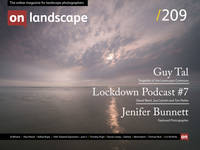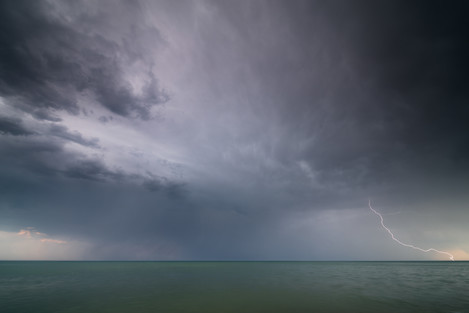Featured Photographer

Jenifer Bunnett
Jenifer Bunnett is a fine art photographer who specialises in coastal imagery. Her work has achieved success in the UK Landscape Photographer of the Year, British Photography Awards, British Life Photography Awards and International Garden Photographer of the Year Awards, and has been exhibited widely.

Michéla Griffith
In 2012 I paused by my local river and everything changed. I’ve moved away from what many expect photographs to be: my images deconstruct the literal and reimagine the subjective, reflecting the curiosity that water has inspired in my practice. Water has been my conduit: it has sharpened my vision, given me permission to experiment and continues to introduce me to new ways of seeing.
Whatever we may think, traces of our upbringing always persist to shape us, and at some stage manifest themselves in our photography. That’s certainly true for Jenifer Bunnett, raised a free spirit in Pembrokeshire but presently – temporarily she hopes – living away from the sea that she loves. Not that that has stopped her from developing a portfolio based around the elements that resonate most: earth, wind and sea. It just takes a little determination and some good planning, plus a willingness to allow for life’s interruptions. In contrast to the energetic frenzy of her good friend Rachael Talibart’s photographs, Jenifer’s images show a quieter side of the sea, though not without the potential to occasionally take her feet from under her.
Can you tell us something about where you grew up, and the extent to which that has shaped you?
West Wales was where I was lucky enough to be brought up. My father fell for Pembrokeshire while doing a holiday job rowing guests to Thorn Island on which sits an old fort. At that time it was run as an alternative (sic Pembrokeshire) hotel. When my parents discovered I was on the way, my mother, a London girl, had to be convinced that Pembrokeshire would be the ideal place in which to raise a child. In those days there was a lot less motorway and Pembrokeshire was decidedly remote. They set up a sailing school, rather ahead of their time. Our cottage, though quite charming, had no electricity or running water. We obtained the latter from a nearby spring. It was indeed the perfect place to raise me; a world of echoey bridges clad in emerald green seaweed, mournfully clinking boats, the ever stirring wind and looming layers of cloud, variously disquieting or reassuring, heightening the senses.
Your father was a photographer. How did this influence your education in the subject, and tastes? What kind of images did you initially set out to make?
Yes, he was. After a few years of running the sailing school, which I gather was successful in a free spirited kind of way, my mother put her foot down. I had a younger brother and another on the way, and she wanted stability, running water and a social life! They headed six miles inland and bought a rambling old farmhouse. It probably seemed as bonkers as the old cottage to some, but it had amenities so my mother was OK with that. Dad had been one of a team of scientists who’d sailed to Spitsbergen to prove the Earth’s tectonic plates had moved and that trip had galvanised his nascent interest in photography. So, photography it was! One room became a studio, another a darkroom. A few years on, he opened a studio in the town centre where his business really expanded. I now had three brothers and specialising in one genre wasn’t really an option; he did it all. Weddings almost every weekend, portraits, industrial and commercial shoots and lots of press photography. One of our favourite childhood memories is of Dad trying to get a roll of film onto the train to arrive in Cardiff for publication in the next morning’s Western Mail, and missing the train, so whizzing along to the next station to try and catch it there. We’d glimpse the train sometimes, jubilant as Dad tried to race it. Occasionally we’d miss all the trains and end up in Cardiff!


